school becomes interesting
Unit 4 School Becomes Interesting答案
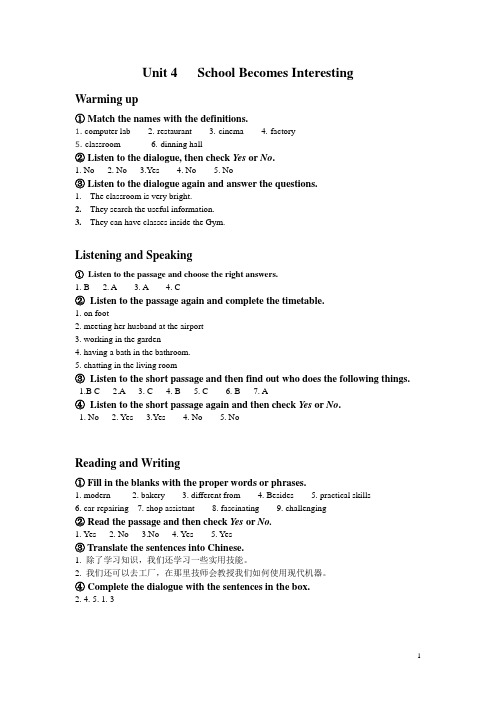
Unit 4 School Becomes Interesting Warming up① Match the names with the definitions.1. computer lab2.restaurant3.cinema4.factory5. classroom6.dinning hall② Listen to the dialogue, then check Yes or No.1. No2. No3.Yes4. No5. No③ Listen to the dialogue again and answer the questions.1.The classroom is very bright.2.They search the useful information.3.They can have classes inside the Gym.Listening and Speaking①Listen to the passage and choose the right answers.1. B2. A3. A4. C②Listen to the passage again and complete the timetable.1. on foot2. meeting her husband at the airport3. working in the garden4. having a bath in the bathroom.5. chatting in the living room③Listen to the short passage and then find out who does the following things.1.B C2.A3. C4. B5. C6. B7. A④Listen to the short passage again and then check Yes or No.1. No2. Yes3.Yes4. No5. NoReading and Writing① Fill in the blanks with the proper words or phrases.1. modern2. bakery3. different from4. Besides5. practical skills6. car-repairing7. shop assistant8. fascinating9. challenging② Read the passage and then check Yes or No.1. Yes2. No3.No4. Yes5. Yes③ Translate the sentences into Chinese.1. 除了学习知识,我们还学习一些实用技能。
Unit 1 School becomes interesting

2).What do the students do in the morning?
They study English and maths in the classroom.
3).What do the students do in the afternoon?
She works as a music teacher in Jiang Hua Vocational School..
Reading and writing.
2)Read and learn. 读邮件,了解李伟的学校生活。 Dear Wang Ping, I am studying at a vocational school now. In the morning, we study English and maths in the classroom. In the afternoon, we do skills training in different places. Some of us work as cashiers in shops or as tour guides for travel agencies. Some work as hotel staff or as secretaries in companies. We also have classes in factories. The workers there show us how to use the modern machines. It’s quite interesting. I’m really happy at this new school. How are you doing? Write and tell me. Yours, Li Wei
新技能英语(1)第一单元教案

教具 The scripts & video clips of dialogues. PowerPoint presentation slides of different vocational schools.
Where are they? What are they doing? II. Introduce the learning content to the students: They are going to read an e-mail about Li Wei’s school life.
教学 环节 设计
单元 Unit 1 School becomes interesting. B
学习 目标
1. To be able to read and understand the meaning of a passage with reading strategies: scanning, skimming and guessing the meaning of unfamiliar words from the context. 2. To be able to analyse and compare information. 3. To be able to understand the meanings of different majors and notices about varied students’ clubs.
V. Ask the students to listen to the dialogue again. And then ask them to form groups and practice it in turns. Ask them to make or act new dialogues with the given words and pictures in Activity ③.
中职英语基础模块(上)unit1第二课时

Car-repair
cookery
accounting
4. 听力(p.8 LISTEN AND PRACTICE)
• (1). 播放听力(第一遍) • What subjects can you hear? • Maths, English, computer basics, cookery, accounting, car-repair • (2). 播放听力(第二遍) • What subjects does Li Wei like? • Accounting • (3). 朗读课文 • Read the passage after me first. Then, let’s read it together. •
Secretary
Cashier Guide Hotel staff
6. 阅读 (p.9 Read and learn)。
• (1). Read and fill in the form. All take where shops Travel agencies company company factory subjects English, maths What to do cashier Tour guide
(4). 播放听力(第三遍),完成表格
subjects
All take Some take Li Lei likes Maths, English, computer basics Cookery, accounting, car-repair Accounting
5. 词汇学习。Match the words with the pictures.
staff secretary
workers
(2). 播放听力
中职英语基础模块(上)unit1第三课时

Room 103
通知撰写
Write a club notice with some key information, such as club’s name, time and place to meet. You can discuss it with your partners.
教师要求通知必须有事因、地点和 时间三要素,鼓励学生使用课文提 供的广告语。
口语表述②
• 1. 教师根据口语表述①中的内容,整理出以下5 个句子,请学生把信息补充写在黑板上。 • 1) I am __________________. • 2) I choose ______________as my major. • 3) I learn __________________ in the school. • 4) I ____________ my major. • 5) I will be a ____________ in the future. • 2. 连句成段表述 • Introduce your major with the help of the information on the blackboard.
• 1. 阅读Read and learn • How many majors are there? • 教师请学生用there be 句型介绍major和job, 例如: • There are 3 majors: Secretarial skills, Accounting and Travel and Tourism. • • 2. 阅读Read again and choose • 教师要求学生阅读后能完成选择任务。 • Read carefully and choose majors for the three students.
unit1英语修订版(基础模块)学生用书第一册第一单元

Warming up
dormitory
宿舍
1. We have skill-training classes in a factory.
我们在一家工厂里上技能训练课。
2. There are six students in my dormitory.
我的宿舍里有六位同学。
Warming up
2 Look and tick. 看图,选出你学过的课程。
有的学汽车修理。 索菲: 你最喜欢什么技能训练课? 李伟:我喜欢会计。这门课很有用。
Listening and Speaking
5 Listen again and fill. 再听录音,填写下表。
All take Some take Li Wei likes
Subjects
maths, English, computer basics cookery, accounting, car-repair accounting
Listening and Speaking
2 Listen and practice. 听录音,谈论校园生活。
Li Wei: You know, my school is quite different. Sophie: Really? In what way? Li Wei: We have our skill-training classes in a factory. Sophie: What do you usually do there? Li Wei: We learn how to use the machines. Sophie: That’s interesting.
Listening and Speaking
Unit4 School becomes interesting
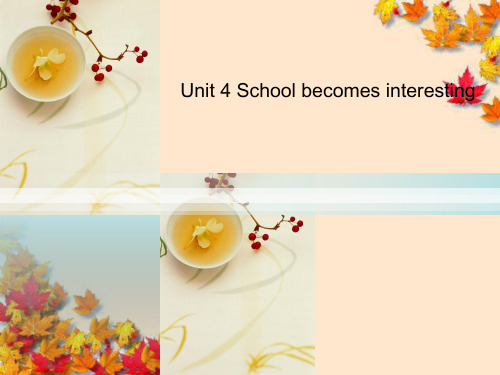
independent inquiry
Teaching aids
Forms
Video
Multi-media devices
Pictures
V. Teaching Procedure
Group study
Lead in
5
1
Summary & Homework
Interactive
4
2
Presentation
III. Teaching methods
Audio- lingual
Communicative
Situational
Projectbased teaching
To cultivate the ability of communication To learn how to describe school life
Outward development
3
Practice
Lead in
Video
School becomes interesting
Questions
Pictures
Different pictures of school facilities
1.Pictures
Presentation
3 Induction 2. Listening
Teaching Objectives Knowledge
●New words & phrases of school life ●Sentence patterns:
Ability
● understand the conversations ●make and perform dialogues ●think inductively &complete the tasks interactively
中职英语基础模块(上)unit1第一课时
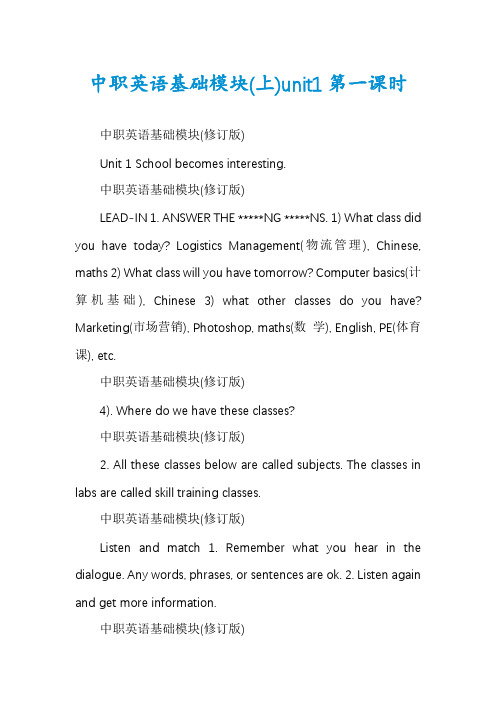
中职英语基础模块(上)unit1第一课时中职英语基础模块(修订版)Unit 1 School becomes interesting.中职英语基础模块(修订版)LEAD-IN 1. ANSWER THE *****NG *****NS. 1) What class did you have today? Logistics Management(物流管理), Chinese, maths 2) What class will you have tomorrow? Computer basics(计算机基础), Chinese 3) what other classes do you have? Marketing(市场营销), Photoshop, maths(数学), English, PE(体育课), etc.中职英语基础模块(修订版)4). Where do we have these classes?中职英语基础模块(修订版)2. All these classes below are called subjects. The classes in labs are called skill training classes.中职英语基础模块(修订版)Listen and match 1. Remember what you hear in the dialogue. Any words, phrases, or sentences are ok. 2. Listen again and get more information.中职英语基础模块(修订版)3. Discuss with your group members and fill in the blanks with your own words. Then show the dialogue to the class.中职英语基础模块(修订版)Listening and Speaking3Listen again and practice.再听录音,根据提示表演对话。
unit1英语修订版(基础模块)学生用书第一册第一单元知识讲稿

In what way? 是In what way is it different? 的 省略形式。在口语中,常会用到一些省略形式。
usually:通常,表示频率。类似的副词还有 always(总是),often(经常),never(从来不)。
李伟:你知道吗,我的学校与众不同。 索菲: 真的吗?在哪方面呢? 李伟:我们在工厂里上技能训练课。 索菲: 你们通常都在那里做什么呢? 李伟:我们学习如何使用机器。 索菲: 那很有趣。
Reading and Writing
1 Read and learn. 读邮件,了解李伟的学校生活。
accounting, and others learn car-repair. Sophie: What skill-training classes do you like best? Li Wei: I like accounting. It’s very useful.
参考译文
索菲: 李伟,你这学期都上什么课? 李伟:我们全都上数学,英语和计算机基础课。 索菲: 你们都上相同的技能训练课吗? 李伟:不是。我们中有的人学烹饪,有的学会计,还
Key sentences:
Warming up
classroom
教室
Warming up
computer lab
计算机房
Warming up
factory
工厂
Warming up
library
图书馆
Warming up
dormitory
宿舍
1. We have skill-training classes in a factory.
有的学汽车修理。 索菲: 你最喜欢什技能训练课? 李伟:我喜欢会计。这门课很有用。
中职英语教材(外研版基础模块)第...

talk about your school life. 课件投影,显示下列内容:
4. …
Unit 4 School Becomes Interesting
You will be able to talk about your
school life.
18’ 提 高 引导学生学习两则对话:
设计这
听力 Dialogue One (P48③④) 1. 引导学生根据单词、关键句及书 上 的 图 片 预 测 对 话 内 容 。( The
4. 因为《学生练习册》中 P35②,P36②和 P39①②的选词填空练习有许 多重复之处,我将之整合成词汇检测题,便于检测学生的词汇运用情 况。
5. 我增加了 Oral Practice (introducing my school life) 这项内容,是想强 化学生的语言运用能力。
二、分课时教学设计
节。学
up in the morning?
生带着
A.6:30 B. 7:00 C. 7:30
问题
②When does she have breakfast?
“听”
A.6:30 B. 7:00 C. 7:30
,心中
③ How does she go to school?
就有了
A. By bike B. On foot C. By bus
a. Are the students in the classroom? Answers:
话题,
b. Where are they?
1. No, they aren’t. 2. 激发学
c. What are they doing?
They are in the
中职《英语》上册课程教学授课计划

教学进度表
教师姓名:课程名称:英语(上册)
周次
章节
教学内容
需用课时
课外作业
15
Unit 9
Life goes electronic1-machine in our life
2
有
16
Unit 9
Life goes electronic2-yourmoblilephone
2
有
16
Unit 10
Happy New Year1-Chinese and foreign festivals
2
有
17
Unit 10
Happy New Year2-sing a song jingle bells
2
无
17
Task Unit 2
Revision- make a card for teacher
2
无
18
复习
2
无
18
机动
2
19
笔试考试
2
19
口语考试
2
2
有
14
Unit 7
Can I take your order2-take orders
2
无
14
Unit 8
We’d like to check in1-departments and facilities of hotel
2
有
15
Unit 8
We’d like to check in2-offer services in hotel
2
有
10
Unit 4
How can I get to the museum2-more ways of going out
Unit 4 School Becomes Interesting试题
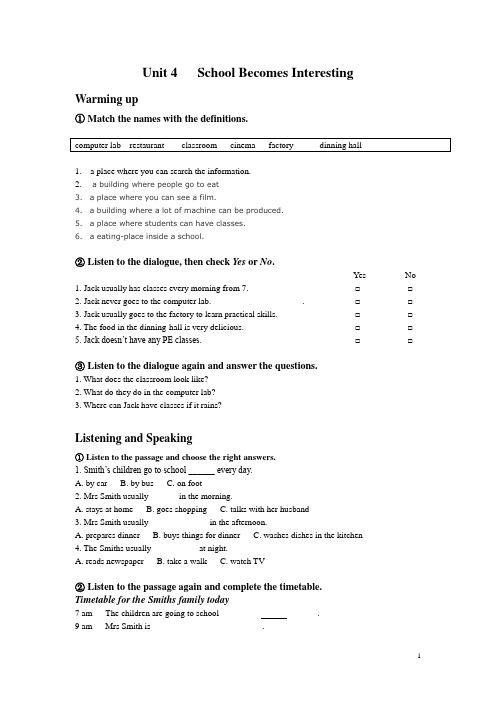
Unit 4 School Becomes InterestingWarming up① Match the names with the definitions.1. a place where you can search the information.2. a building where people go to eat3. a place where you can see a film.4. a building where a lot of machine can be produced.5. a place where students can have classes.6. a eating-place inside a school.② Listen to the dialogue, then check Yes or No.Yes No1. Jack usually has classes every morning from 7. □□2. Jack never goes to the computer lab. . □□3. Jack usually goes to the factory to learn practical skills. □□4. The food in the dinning-hall is very delicious. □□5. Jack doesn’t have any PE classes.□□③ Listen to the dialogue again and answer the questions.1. What does the classroom look like?2. What do they do in the computer lab?3. Where can Jack have classes if it rains?Listening and Speaking① Listen to the passage and choose the right answers.1. Smith’s children go to school ______ every day.A. by carB. by busC. on foot2. Mrs Smith usually ______ in the morning.A. stays at homeB. goes shoppingC. talks with her husband3. Mrs Smith usually _____________ in the afternoon.A. prepares dinnerB. buys things for dinnerC. washes dishes in the kitchen4. The Smiths usually __________ at night.A. reads newspaperB. take a walkC. watch TV② Listen to the passage again and complete the timetable.Timetable for the Smiths family today7 am The children are going to school _________ _______.9 am Mrs Smith is _________________________.4 pm Mrs Smith is __________________________.6 pm The children are _________________________.9 pm The smiths are ___________________________.③ Listen to the short passage and then find out who does the following things.A. the childrenB. Mr ThompsonC. Mrs Thompson1.get up at five o’clock ___________2.get up at 6 __________3.prepares breakfast for the whole family ____________4.goes to work ________ __ _5.stays at home _______ ____6.arrives home late _______ ____7.arrive home early. ___ ________④ Listen to the short passage again and then check Yes or No.Yes No1. Mr Thompson sometimes goes shopping on his way home. □ □2. Mrs Thompson usually sees her friends. □ □3. At night, the children always do their homework. □ □4. Mrs Thompson usually reads newspaper. □ □5. Mr Thompson watches television. □ □Reading and Writing1. What a ______ building, it can only appear in the twenty-first century.2. It’s my wife’s birthday, I have to go to the ________ to buy a cake for her.3. Although they are twins, they are very ______________ each other.4. _______________ Kevin, there are still two boys who pass the driving test.5. Many people believe that ____________ are more important than the knowledge in the book.6. My car often breaks down; I really hope I know something about ____________.7. The ____________ in this shop is very helpful.8. The park which we went to yesterday is very ___________.9. Life is very _________, for you never know what will happen.② Read the passage and then check Yes or No.Dear Betty,You asked me how my school life was like in your last letter. As you know, our school is very different from other high schools. Besides learning knowledge, we also learn practical skills. Wehave a lot of skill-training classes outside our school. Some of my classmates work as shop assistants. Some go to the bakery to learn how to make cakes. Boys, they usually go to practice car-repairing. We can also go to the factory where the technicians teach us how to use modern machine. So, you can see that our life is very fascinating here, but it is also very challenging.Yours,LilyYes No1. Lily’s school is different fr om other high schools. □ □2. They usually have a lot of skill- training classes in their school. □ □3. Girls usually work as shop assistants. □ □4. Boys usually go to practicing car- repairing. □ □5. Lily feels her life is very exciting. □ □③ Translate the sentences into Chinese.1. Besides learning knowledge, we also learn practical skills.2. We can also go to the factory where the technicians teach us how to use modern machine.Wendy: Hi, Bruce, _____________________________________.Bruce: I am very happy with it. It is very interesting.Wendy: ______________________________________Bruce: We have to learn Chinese, English, Math, computer and so on.Wendy: _________________________________________Bruce: I like computer class a lot, and sometimes we go to the factories.Wendy: _____________________________________________Bruce: we can put what we learn into practice.Wendy: That’s great. _____________________________________Bruce: I usually play football with my classmates.Language in Use① Circle the correct words.1. Lily like / likes eating cake very much.2. We usually have/has breakfast at 7 o’clock.3. Does he often goes / go to school by bus?4. I learns / learn playing piano every Sunday.5. Mary and Mike becomes/become good friends.6. I don’t like / not like apples.② Fill in blanks with the proper form of the words in the brackets.1.She ______ (have) four classes in the morning.2.My father ______ (write) to me every month.3.She ______ (help) her mother do housework every evening.4.How often _____ Ken usually _____ (go) swimming?5.I _____ (not) have to work late everyday.Skill practice1. There are some differences between Lily and Lucy.______________________________________________2. I’ll do what you told me to do.________________________________________ ____3. The guide will lead us to see everywhere in the city._______________________________________ ______4. Tom goes too the park, the other three boys also go to the park.________________________________________ _____5. I like my school life very much.______________________________________________6. I have to stay at home all the day long.______________________________________________② Choose the best answers.1. I usually _________newspapers in the morning.A. readsB. readC. am reading2. How often ______ she go to the cinema?A. isB. doC. does3. They ______ think English is more difficult than Chinese.A. do notB. notC. no4. _____ Mike usually ______ to school with you?A. Do, goB. Does, goC. Do, does5. _____ you eat at home every morning.A. IsB. DoC. DoesFor Better Performance① Complete the passage with the proper words in the following box.My name is Lin Fang. Now I am study in a high school. I like my school very much. And I am very 1. _____ with my school life here. My school is very 2. _____ from other high school.3.______ knowledge, we also have4. ________ class. The teachers here are very5._______, we can learn a lot of things6. _____ them. We often7.______ factories. The8.______ there can teach us how to use9.______ machines. It is very interesting, but not 10. ______.② Write a passage about your school life. The following questions may help you.1. Do you like your school?2. Is there something different in your school?3. What do you learn in your school?4. What do you think of your teachers?5. How do you find you school life, is it interesting or boring?。
教学设计School-becomes-interesting

Ability Teaching Reflection教学反思
1.Sentence patterns
2.Read dialogues
School life
3.Tasks 4.feedack
2.教学难点
模仿Listen and practice内容进行对话。策略:引导学生, 小组讨论并表演对话
教学过程
Lead in导入 1
2
Diagnosis诊断
Group study 5
Interactive
Teaching reflection
教学反思
4
Appraisal鉴定
3
Practise练习Байду номын сангаас
Task 2: Listen again and answer the questions
Task 3:Read the dialogue in a group, then act it out in role plays.
Ability Development Appraisal能力发展鉴定
Task completion discuss &appraisal Act it in groups Make a new dialogue
(1).进一步激发学生对学校生活的热爱 (2).缓解英语学习中的焦虑情绪,培养学生积极的学习态度
教法和学法
Status & Function
为了激活课堂,提 高学生朗读理解能
力。
Students on learning methods 教学和学法
1.Ask to observe观察
Students
Ability Development Mobilizing能力发展动员
外研社中职英语基础模块一 unit1 第二次课
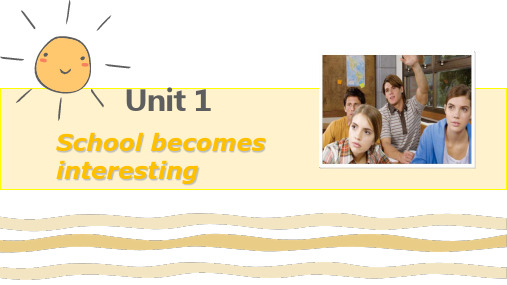
[ˈdifrənt] [stɑːf] [pleis] [ˈtræ vl] [ˈkʌmpəni] [kæ ˈʃiə] [ˈsekrətri]
不同的 职员 地方 旅游 公司 收银员 秘书
Read and learn.
读邮件,了解李伟的学校生活。
Dear Wang Ping, I am studying at a vocational school now. In the morning, we
技能 培训 机器 科目 烹饪 会计
[skil] [trein] [məˈʃiːn] [ˈsʌbdʒikt] [ˈkukəri] [əˈkauntiŋ]
Listen and practice. 听录音,谈论校园生活。
Li Wei: You know, my school is quite different. Sophie: Really? In what way? Li Wei: We have our skill-training classes in a factory. Sophie: What do you usually do there? Li Wei: We learn how to use the machines. Sophie: That’s interesting.
亲爱的王萍: 我目前在一所职业学校学习。上午,我们在教室
里上英语和数学课。下午,我们在不同的地方进行技 能训练。我们中有些人在商店里做收银员或在旅行社 做导游。还有一些人在饭店做实习员工或者在企业做 秘书。我们也在工厂上课。工厂里的工人们给我们展 示如何使用现代化的机器。这种学习方式很有趣。
在这所新学校里我真的很快乐。你怎么样?写 信告诉我你的情况吧。
参考译文
Listen again and act.
新技能英语(1)unit_1_school
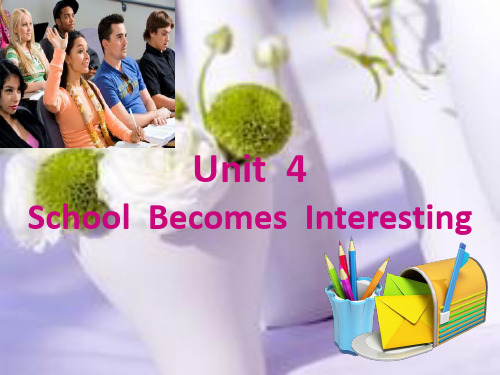
Answer the questions
• Q1: How many hours do you study in the classroom everyday? • Q2: Do you have PE class? • Q3: Do you go to workshops or factories to learn practical skills? PE class体育课
Listen and complete the dialogue with the proper form of the words.
• • • • • • • • • •
find Lucy: Hi, Bob. How do you 1)________ your school ? 嗨,鲍勃。你的学校怎么样? Bob: I like it very much. It’s nice. 我很喜欢它,它很好。 subjects do you have?你们有些什么科目? Lucy: What 2)________ Bob: Besides maths and English, we have 除了数学和英语,我 们有技能训练课。 skill-training 3)________________ classes. We all study computer science. Some of us learn cooking or car-repairing. 我们所有人都要学习计算机科学。 有些同学学习烹饪和汽车维修。 Lucy: What training classes do you like? 你喜欢什么样的训练课? computer Bob: I like 4)___________ science and car-repairing. 我喜欢计算机科学和汽车维修。 useful They are very 5)__________. 它们非常有用。
外研社中职英语unit 4
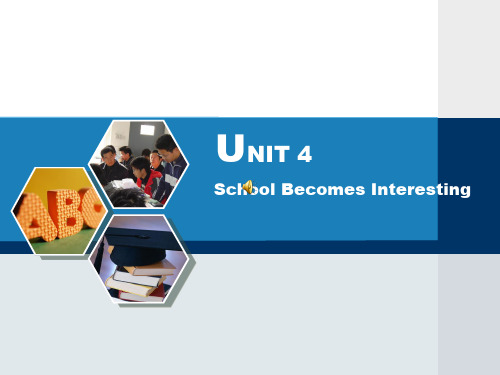
Tom: When do you usually get up in the morning? Claire: Well, I get up at 7:00 and I have breakfast at 7:30. Tom: Do you go to school buy bus? Claire: No, I don’t. I always walk to school. Tom: When do you start your classes? Claire: Half past eight. Tom: What do you do after classes? Claire: I often do sport. Tom: Good for you.
Warming up
Read the words and expressions and listen to the dialogue.
by bus always
坐公交车
adv. 总是,永远
v. 出发,开始
start
do sports
做运动
Warming up
Read the words and expressions and listen to the dialogue.
Yes, they do.
3. What do they do in the factories? They learn how to use machines. 4. What does Zhang Yu ask Lin Wei to do? Zhang Yu asks Lin Wei to study English well.
Warming up
Listen again and match the expressions with the pictures.
新技能英语(1)unit_1_schoolppt课件

• Lin Wei: The technicians teach us how to use the
•
machines. It’s interesting but not easy. There
•
are so many English words on the machines.
• Zhang Yu: So you must learn English well to read them.
• Q2: Do you have PE class?
• Q3: Do you go to workshops or factories to learn practical skills?
PE class体育课
practical skills 实用技能
['præktikəl] adj.实用的;实际的,有实用价值的
ppt课件
3
student apartment 学生宿舍
[ə’pɑ:tmənt] n.一套公寓房间,房间
b 计算机房
[kʌm’pju:tə] n.计算机,电脑
ppt课件
5
classroom ['klɑ:sru:m] n.教室
ppt课件
6
factory ['fæktəri] n.工厂,制造厂
• Lin Wei: Thank you for your advice.
ppt课件
15
Words and expressions
• different ['difrənt] from 不同于
• high school 高中 High School Musical 《歌舞青春》 • vocational school 职业学校 • skill [ski:l] n.技能,技巧 • the whole [həul] day 整天 • machine [mə'ʃi:n] 机器 • advice [əd'vais] n.劝告,忠告,意见
职高英语基础模块教案第一单元
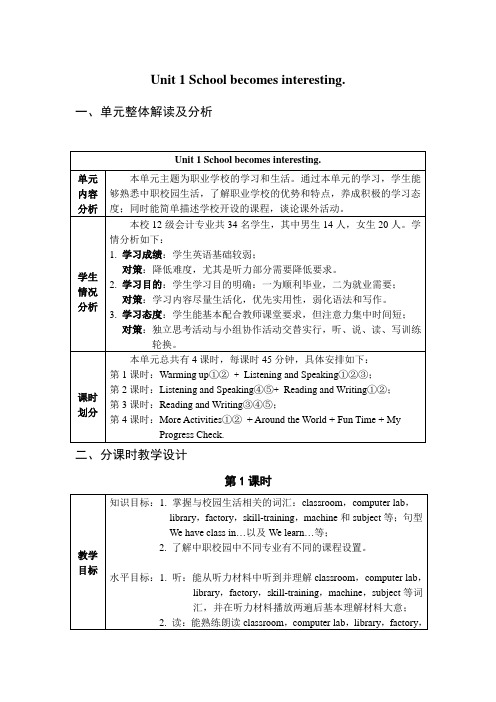
Unit 1 School becomes interesting.一、单元整体解读及分析二、分课时教学设计第1课时skill-training,machine和subject等词汇,流利朗读We have class in…以及We learn…等句型;3. 说:能用classroom,computer lab,library,factory,subject,machine和skill-training等词汇造句,能根据提示模仿Listen and practice内容实行对话。
情感目标:1.缓解英语学习中的焦虑情绪;2.培养英语学习的兴趣。
教学重点We have class in…和We learn…句型。
教学难点模仿Listen and practice内容实行对话。
教学方法任务教学法、情境教学法。
学习方法独立学习法、小组合作法。
教学媒体多媒体课件。
教学过程预设时间教学环节教师活动学生活动设计意图2’导入1. 师生Greeting互动。
2. 教师随机问学生:1) What class did you have today?2) What class will you have today?集体回答,个别回答。
拉近师生距离,迅速进入主题。
6’词汇学习1. 提问教师展示本班课程表提问,然后把学生给出的答案写在黑板上。
要求学生不能重复黑板上已有的答案。
1) What will we learn this week?2) What did we learn this week?个别回答,集体回答。
学生不会念Biology,Career以及Sales等单词或念不准让学生看到自己的日常课程表(中英文对照),在有中英文互译的参考下,能缓解学生回答问题的焦虑,使其更好地进入学习的状态。
词汇学习2. 匹配教师展示学校平面图。
通过提问,请学生将课程与上课地点匹配。
1) Where do we have these classes?2) All these classes below are calledsubjects. The classes in labs are calledskill training classes.Chemistry和Maths等单词,能够跟着教师一起朗读。
- 1、下载文档前请自行甄别文档内容的完整性,平台不提供额外的编辑、内容补充、找答案等附加服务。
- 2、"仅部分预览"的文档,不可在线预览部分如存在完整性等问题,可反馈申请退款(可完整预览的文档不适用该条件!)。
- 3、如文档侵犯您的权益,请联系客服反馈,我们会尽快为您处理(人工客服工作时间:9:00-18:30)。
where
in the classroom
in different places
what to do
study English and maths
do skills training
Reading and Writing
3
Read and learn. 读以下三个专业的介绍。
Major: Secretarial Skills Main subjects: Chinese, Computer Basics,
专业:旅游 主要课程:语文,英语,客户服务 未来职业:导游
Reading and Writing
4 Read again and choose.
人员选择专业。 根据上文,为下列
Liu Gang
He is very careful and likes to work with numbers.
他很细心,喜欢和数字打交道。
Warming up
classroom
教室
Warming up
computer lab
计算机房
Warming up
factory
工厂
Warming up
library
图书馆
Warming up
dormitory
宿舍
Warming up
training room 实训室
Warming up
S1: We learn how to sell goods.
S2: That’s interesting.
store/sell goods
Listening and Speaking
3 Listen again and act. 再听录音,根据提示表演对话。
S1: You know, my school is quite different. S2: Really? In what way? S1: We have our skill-training classes in a restaurant. S2: What do you usually do there? S1: We learn how to prepare food. S2: That’s interesting. restaurant/prepare food
参考译文
In what way? 是In what way is it different? 的省略形式。在口语中,常会用到一
些省略形式。
usually:通常,表示频率。
类似的副词还有 always(总是),often
(经常),rarely(极少)never(从来不)
。
李伟:你知道吗,我的学校与众不同。 索菲: 真的吗?在哪方面呢? 李伟:我们在工厂里上技能训练课。 索菲: 你们通常都在那里做什么呢?
专业:会计
主要课程:数学,会计基础
未来职业:银行出纳员
Reading and Writing
3
Read and learn. 读以下三个专业的介绍。
Major: Travel and Tourism Main subjects: Chinese, English, Customer Service Future job: tour guide
2 Look and tick.
看图,选出你学过的课程。
√ English √ maths
√ cooking √ √ computer basics√
car-repair chemistry
What’s more
geography History class Physics class P.E Chinese Music class Art class Biology class Nature study trditional culture Professional courses
Accounting
Reading and Writing
4 Read again and choose.
人员选择专业。 根据上文,为下列
Lisa
She likes to travel, meet people and make new friends.
她喜欢旅游、结实不同的人和结交新朋友。
Travel and Tourism
Hotel 宾馆
Travel Agency 旅行社
1. We have skill-training classes in a factory.
我们在一家工厂里上技能训练课。
2. There are six students in my dormitory.
我的宿舍里有六位同学。
Warming up
李伟:我们学习如何使用机器。
索菲: 那很有趣。
Listening and Speaking
3 Listen again and act. 再听录音,根据提示表演对话。
S1: You know, my school is quite different.
S2: Really? In what way? S1: We have our skill-training classes in a store. S2: What do you usually do there?
Listening and Speaking
1
Listen and learn.
skill train
听录音,学习下列词语。
n. 技能 v. 培训 n. 机器 n. 学科,科目 n. 烹饪 n. 会计
machine subject
cookery accounting
Listening and Speaking
2
Listen and practice.
听录音,谈论校园生活。
Li Wei: You know, my school is quite different. Sophie: Really? In what way? Li Wei: We have our skill-training classes in a factory. Sophie: What do you usually do there? Li Wei: We learn how to use the machines. Sophie: That’s interesting.
Sophie: What skill-training classes do you like best?
Li Wei: I like accounting. It’s very useful.
参考译文
索菲: 李伟,你这学期都上什么课?
李伟:我们全都上数学,英语和计算机基础课。 索菲: 你们都上相同的技能训练课吗? 李伟:不是。我们中有的人学烹饪,有的学会计,还 有的学汽车修理。
参考译文
work as cashiers:做收银员的工作。这里as表示 作为。例如:As a student, he is very hardworking.
作为一名学生,他非常努力。
亲爱的王萍: 我目前在ቤተ መጻሕፍቲ ባይዱ所职业学校学习。上午,我们在教室 里上英语和数学课。下午,我们在不同的地方进行技 能训练。我们中有些人在商店里做收银员或在旅行社 做导游。还有一些人在饭店做实习员工或者在企业做 秘书。我们也在工厂上课。工厂里的工人们给我们展 示如何使用现代化的机器。这种学习方式很有趣。 在这所新学校里我真的很快乐。你怎么样?写 信告诉我你的情况吧。 你的, 李伟
Business Communication
Future job: secretary in a company
专业:秘书
主要课程:语文,计算机基础,
商务交际 未来职业:公司秘书
Reading and Writing
3
Read and learn. 读以下三个专业的介绍。
Major: Accounting Main subjects: Maths, Accounting Basics Future job: bank teller
Reading and Writing
1
Read and learn.
读邮件,了解李伟的学校生活。
Dear Wang Ping, I am studying at a vocational school now. In the morning, we study English and maths in the classroom. In the afternoon, we do skills training in different places. Some of us work as cashiers in shops or as tour guides for travel agencies. Some work as hotel staff or as secretaries in companies. We also have classes in factories. The workers there show us how to use the modern machines. It’s quite interesting. I’m really happy at this new school. How are you doing? Write and tell me. Yours, Li Wei
Unit 1
School becomes interesting.
Look at the picture and discuss:
1. Where are they? 2. What are they doing?
You’ll be able to:
